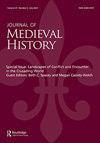‘A competent mess’: food, consumption and retirement at religious houses in England and Wales, c.1502–38
IF 0.3
2区 历史学
0 MEDIEVAL & RENAISSANCE STUDIES
引用次数: 0
Abstract
ABSTRACT This article contributes to our knowledge of food habits in late medieval and early sixteenth-century England and Wales through an analysis of under-examined records of retirement agreements known as corrodies; these were struck between religious houses and individuals or married couples. Corrody texts, copied in records from the Court of Augmentations, are a rich source for patterns of consumption, particularly of beverages and foodstuffs, in the first four decades of the sixteenth century. People from a range of social backgrounds acted as careful consumers in their attempts to guarantee their preferred foods in their retirement years. These late retirement arrangements indicate an evolution of food entitlements in corrodies towards greater specificity in terms of what the corrodians were to receive. They also reflect larger food trends of this period, such as a move away from pottage and a desire to secure access to meat and other animal-derived foods.“有能力的混乱”:1502年至1538年英格兰和威尔士宗教场所的食物、消费和退休
本文通过对被称为腐蚀的退休协议的未充分审查记录的分析,有助于我们了解中世纪晚期和16世纪初英格兰和威尔士的饮食习惯;这些袭击发生在宗教团体和个人或已婚夫妇之间。从增刊法院抄录的腐朽文本是16世纪前40年消费模式,尤其是饮料和食品消费模式的丰富来源。来自不同社会背景的人们都是谨慎的消费者,他们试图在退休后保证自己喜欢的食物。这些较晚的退休安排表明,腐蚀者的食物权利正朝着更加具体的方向发展,腐蚀者将得到什么。它们也反映了这一时期更大的食品趋势,比如远离汤,渴望获得肉类和其他动物源性食品。
本文章由计算机程序翻译,如有差异,请以英文原文为准。
求助全文
约1分钟内获得全文
求助全文
来源期刊

JOURNAL OF MEDIEVAL HISTORY
MEDIEVAL & RENAISSANCE STUDIES-
CiteScore
0.60
自引率
0.00%
发文量
29
期刊介绍:
The Journal of Medieval History aims at meeting the need for a major international publication devoted to all aspects of the history of Europe in the Middle Ages. Each issue comprises around four or five articles on European history, including Britain and Ireland, between the fall of Rome and the Renaissance. The Journal also includes review articles, historiographical essays and state of research studies.
 求助内容:
求助内容: 应助结果提醒方式:
应助结果提醒方式:


